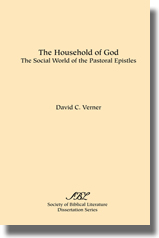
$25.00
“This passage [1 Tim 3:14–15] has supplied the impetus for the present study, in which the following will be argued: The author of the Pastorals sets forth in his composition a coherent concept of the church as the household of God. This concept is two-pronged, informing the author's understanding both of the household as the basic social unit in the church, and of the church as a social structure modelled on the household. This two-pronged concept is developed in such a way in the Pastorals that they contain information about the social strata, social structure and social tensions of the church to which they are addressed.”
— from the introduction
“This dissertation has excellently advanced study of the Pastorals in two areas: criteria for showing how an author uses traditional paraenetic material to address concrete situations; and the social world of the ‘household.’ … In conclusion, this work has shed considerable new and bright light on three documents whose context, social and otherwise, is so elusive.”
— Robert J. Karris, O.F.M., Journal of Biblical Literature
“This 1981 dissertation … brings a fresh and illuminating social perspective to the question of the social situation and strategy of the Pastorals. In the light of a very useful survey of the social structure, class-related values, and social tensions characteristic of the Greco-Roman household, Verner asks how the use of household code tradition and a model of the Christian community as ‘household of God’ reflects the social location and interests of the author and serves ideologically to define and address problematic issues concerning structure, status, and internal tensions in the church of the Pastorals. A problem of insubordination, Verner concludes, especially regarding younger women encouraged by certain ascetical teaching to reject the traditional roles of marriage and motherhood, represented a conflict of values concerning status and emancipation within the Christian community. In order to overcome internal dissension and protect the church’s social repute, the author brands the teaching as ‘false,’ and employs both the domestic code and the image of church as ‘household of God’ as means for inculcating traditional patriarchal values, securing the authority and interests of a wealthy male leadership, and legitimating a controlling hierarchical structure.”
— John H Elliott, Journal of the American Academy of Religion
